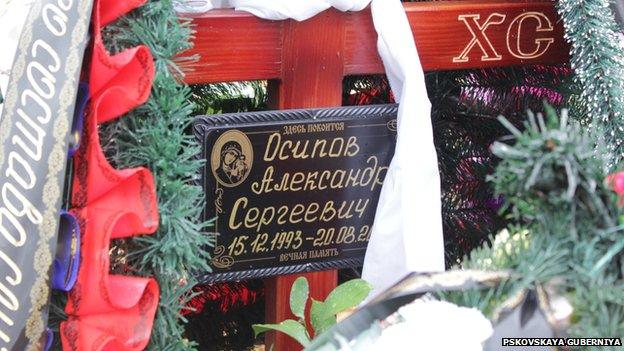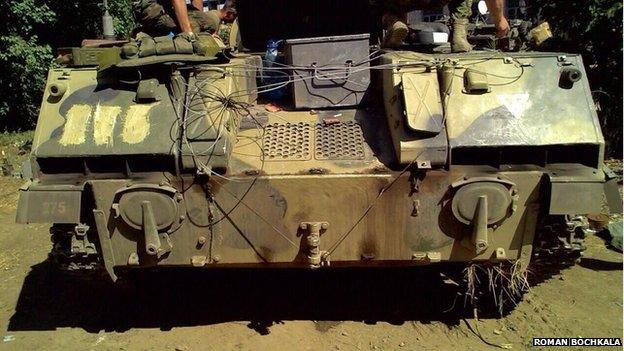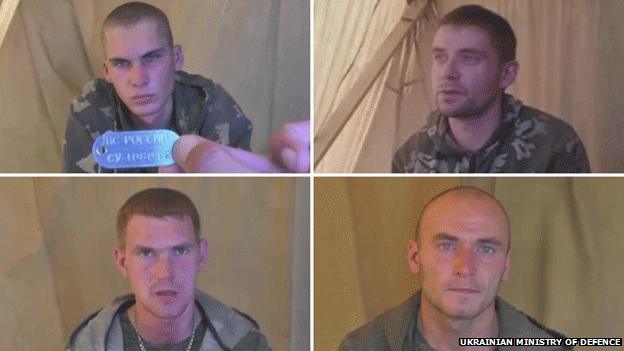Russian reporters 'attacked at secret soldier burials'
- Published

Russian journalists say it is "really dangerous" to report about the graves they have discovered
Russian journalists say they have been attacked while investigating reports that soldiers were secretly buried after being killed in Ukraine.
The paratroopers were buried in a village near the western city of Pskov, where they were based.
What appears to be fresh graves of the killed paratroopers were first spotted in the village by Pskovskaya Guberniya, external, a local newspaper.
Its journalists say they were attacked at the cemetery.
Ukrainian government officials accuse the Kremlin of helping separatists in eastern Ukraine by sending in military hardware and troops, many of them via the southern region of Rostov.
Russia denies the claims. Asked about allegations of Russian soldiers being involved in fighting in Ukraine, Foreign Minister Sergei Lavrov told a news conference on Tuesday that they amounted to "disinformation".
"Reporting this is really dangerous," one of the Pskov journalists told the BBC.
Later, two Moscow-based reporters visited the village to investigate the reports.
Vladimir Romensky and Ilya Vasyunin say, external they were approached by two men who told them that they would "never be found" unless they boarded the next train back to Moscow.

The Pskov paratroopers' armoured personnel carrier allegedly captured by the Ukrainians
Ignoring the threats, the two visited the local cemetery where the soldiers' graves had reportedly been found.
There, their car was attacked by two men, who pelted it with stones and slashed its tyres. Independent Dozhd TV, for which Mr Romensky works, later posted footage of the attack, external.
Also in the car were two other journalists who claim that while attempting to visit the cemetery earlier in the day they had been forced into a van and taken to a forest.
Their abductors erased memory cards from their cameras and threatened to kill them should they make the incident public, says one of the reporters, Nina Petlyanova, external.
Sergei Kovalchenko, external from Telegraf news agency is another journalist who says he was threatened. He said his memory card was erased by plain-clothed men while visiting the cemetery.
Dozhd TV later said name plates and wreaths had been removed from the graves.
'Classified'
There has been no official confirmation of the deaths of paratroopers allegedly buried outside Pskov.
However, a military official in Voronezh, a city close to the border with eastern Ukraine, says that an elite airborne platoon commander from Pskov, Anton Korolenko, has been buried there.
He died on 19 August "while carrying out his duties", the official told local news agency RIA Voronezh, external, declining to give details. The platoon commander's relatives also refuse to reveal how he died, saying that this information was "classified".
A little later, Ukrainian journalist Roman Bochkala posted photographs, external of what he said was an armoured personnel carrier seized from the Pskov paratroopers, as well as paperwork and IDs found inside.

Russia said on Tuesday 10 of its soldiers captured in east Ukraine had crossed the border by accident
Last week, Russian Defence Minister Sergei Shoigu visited Pskov amid speculation that his trip was related to the local troops' deaths in Ukraine.
Earlier, President Vladimir Putin awarded an Order of Suvorov, external to the Pskov-based 76th airborne division, where Anton Korolenko served, for "bravery and heroism" while performing unspecified tasks.
Reports from Russia also indicate that there has been a sudden and unexplained upsurge in the number of killed or wounded military servicemen.
On Tuesday, Russia's presidential human rights council said about 100 wounded servicemen had been airlifted to a military hospital in St Petersburg for treatment. Nine soldiers were killed at a training range in Rostov region, it said.
Military hospitals in Rostov region and southern Russia were "overflowing", a council spokeswoman said.
BBC Monitoring, external reports and analyses news from TV, radio, web and print media around the world. For more reports from BBC Monitoring, click here. You can follow BBC Monitoring on Twitter , externaland Facebook, external.